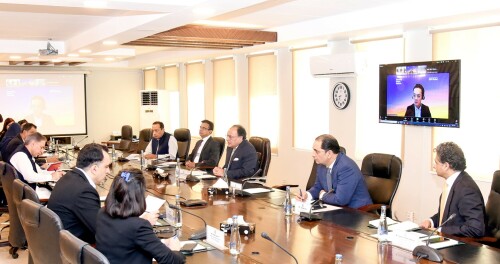Pakistan Aims for 10.6% Tax-to-GDP Ratio by Fiscal Year-End
Finance Minister Muhammad Aurangzeb has announced that Pakistan’s tax-to-GDP ratio is projected to climb to 10.6% by the close of the current fiscal year.
Aurangzeb conveyed this during a virtual meeting held on Friday with representatives from S&P Global Ratings as part of the ongoing Pakistan Sovereign Ratings Review. This increase signifies advancement toward the government’s objective of elevating the ratio to 13% by the end of the 37-month Extended Fund Facility (EFF) program with the International Monetary Fund (IMF).
The Finance Division issued a statement summarizing Aurangzeb’s presentation of a comprehensive outline of the government’s macroeconomic reform plans during the session. He reaffirmed Pakistan’s dedication to achieving sustainable and inclusive economic expansion through enhanced productivity and export promotion.
Reforms and Economic Stability
He underscored the continuation of reforms throughout vital sectors, including taxation, energy, state-owned enterprises (SOEs), privatization, public finance management, streamlining governmental functions, and more proactive debt management approaches.
Aurangzeb clarified that the separation of the Tax Policy Office from the Federal Board of Revenue (FBR) is part of a larger initiative to align tax policymaking with economic value principles, rather than focusing solely on administrative convenience.
He highlighted that inflation and the current account deficit (CAD) have shown positive trends throughout the year, contributing favorably to overall economic stability.
Aurangzeb also emphasized the achievement of surpluses in both the primary balance and the current account as significant accomplishments, highlighting the improving fundamentals of Pakistan’s economy.
The finance minister reported that the country’s external portfolio is being effectively managed, with foreign exchange reserves forecasted to reach $14 billion by the end of June. This projection is supported by anticipated institutional and trade inflows, robust remittances, and decreasing oil prices, all of which are alleviating pressure on the external account.
International Support for Pakistan’s Reforms
During the meeting, the finance minister also shared takeaways from his recent trip to the United States for the World Bank/IMF Spring Meetings. He indicated that feedback from these meetings consistently demonstrated recognition and support for Pakistan’s structural reforms and macroeconomic stability achievements over the preceding 14 months.
Aurangzeb concluded by stating that international partners strongly encouraged Pakistan to maintain its current course, intensify the reform momentum, and concentrate on establishing permanence in economic stability.



Comments (0)
No comments yet. Be the first to comment!
Leave a Comment